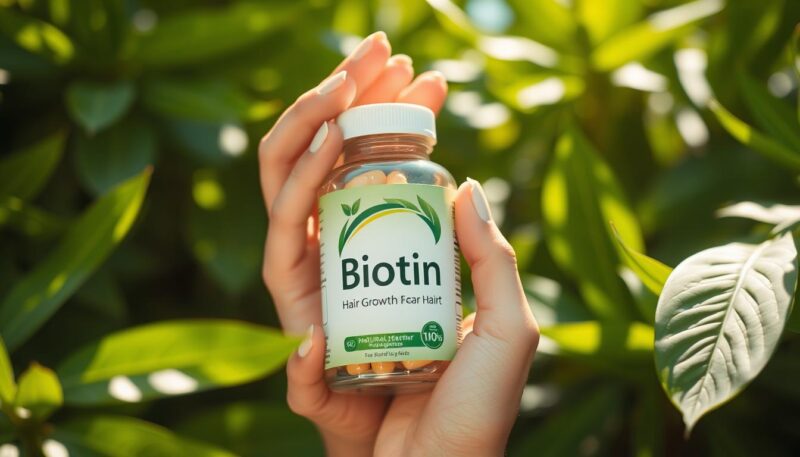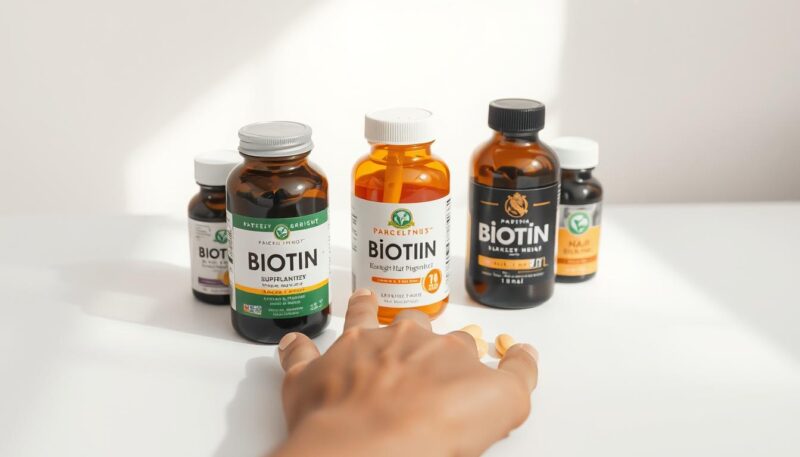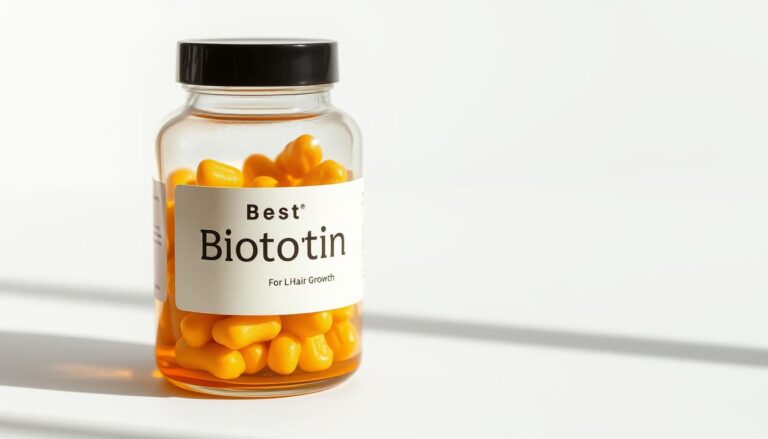Over 50% of women and 70% of men face hair thinning or loss in their lifetime. This makes biotin supplements a top choice for those seeking solutions. With so many biotin gummies, tablets, and formulas out there, it’s hard to know what really works.
Dermatologist Vivian Bucay, MD, says even high-dose biotin supplements—like those with 10,000 mcg—may not guarantee results. This is unless they are paired with a balanced diet and proper dosage.
Experts warn that most Americans already get enough vitamins like biotin (35–70 mcg daily) from their meals. Yet, supplements are still popular. Options like Ritual Multivitamin ($31) and Vital Proteins Collagen ($15) are found on many shelves. This article aims to cut through myths and show which biotin supplements are backed by science and dermatologist advice.
Key Takeaways
- 50-70% of adults experience hair loss, driving demand for biotin supplements.
- High-dose biotin (e.g., 10,000 mcg) is common, but effectiveness varies.
- Most people get enough biotin from diets, yet deficiencies can still occur.
- Popular 2024 options include Wellbel gummies ($70) and OLLY Softgels ($19).
- PRP therapy costs $600–$1,200, but results are inconsistent.
Understanding Biotin and Its Role in Hair Health
Biotin, also known as vitamin B7, is key for hair health. It helps make keratin and gives energy to cells. If you don’t get enough, you might lose hair.
This vitamin is important for keeping hair follicles healthy. It also helps prevent hair from breaking.
What Is Biotin and Why It Matters
Biotin is found in foods like eggs, salmon, and almonds. It turns nutrients into energy for hair growth. You only need 30–35 mcg a day.
Many people take supplements to support their hair and nails. But, if you have digestive problems or take certain medicines, you might not get enough.
The Science Behind Biotin’s Effects on Hair
Biotin makes hair stronger by increasing keratin. Some studies show it can make hair thicker. But, how well it works can vary.
A 2012 study found that multivitamins with biotin made hair thicker in 541 women. But, some doctors are still unsure about biotin’s role alone.
Biotin Deficiency and Hair Loss Connection
Not getting enough biotin can make hair brittle and cause it to break and thin. Research found that 38% of women with hair loss had low biotin levels.
Some people might not get enough biotin because of their genes or health issues like inflammatory bowel disease. A study of 22 people who had gastric surgery found that 5 of them had less hair loss after taking biotin.
- Common deficiency causes: medications, digestive disorders, alcoholism
- Severe deficiency symptoms: skin rashes, brittle nails, hair thinning
- Deficiency is rare in balanced diets but impacts vulnerable groups
Biotin is important for hair health, but its effectiveness alone is still debated. Adding zinc and vitamin C to biotin might help more. Always talk to a doctor before taking a lot of supplements.
Key Benefits of Biotin Supplements for Hair Growth
Biotin supplements are popular for improving hair health. They are especially helpful for those with biotin deficiencies. These supplements can make hair stronger by supporting keratin production and reducing breakage.
They also help create a healthy scalp environment. This is good for hair follicles to grow well.
Studies show that biotin works best with other vitamins for hair growth. Vitamins like B7 (biotin), biotin, and zinc help hair stay strong. Foods like eggs, almonds, and salmon are good sources of biotin.

Some people might need biotin supplements, even if they eat well. Pregnant women, those on certain medications, or with gut issues might lose hair due to low biotin. A 2016 study found biotin helped some post-gastric-sleeve patients with hair loss.
But, high doses of biotin should only be taken with a doctor’s advice. It’s important to talk to a healthcare provider before starting biotin supplements. They can help find the right dose for you.
The Best Biotin for Hair Growth: Top Products Review
Choosing the best biotin supplement depends on your hair goals and budget. Look at these options to find what suits your routine.
Premium Biotin Supplement Options
Top supplements have advanced formulas backed by science:
| Product | Biotin per Serving | Price | Key Features |
|---|---|---|---|
| Nutrafol | 300 mcg | $$ | Combines biotin with caffeine and botanicals for scalp health |
| Viviscal | 160 mcg | $$ | Includes marine collagen and biotin for hair density |
Budget-Friendly Biotin Choices
Affordable options work well without breaking the bank:
- Holland & Barrett Biotin Tablets (1000 mcg per tablet) – £6.59 for 30 tablets
- Nutrabio Biotin Capsules (5000 mcg) – £16.87 for 100 capsules
Combination Supplements with Biotin
Multi-vitamin blends offer extra benefits:
| Product | Biotin + Vitamins | Format |
|---|---|---|
| Perfectil Plus Hair | Biotin (150 mcg) + 25+ vitamins | Tablets |
| MyVitamins Gummies | Biotin (160 mcg) + vitamins A, C, E | Gummies |
Organic and Natural Biotin Sources
Natural supplements use whole foods:
Products like Garden of Life Mykind Organic or MindBodyGreen Collagen+ have lots of biotin. They also use organic ingredients. Foods like eggs, almonds, and avocados are natural sources of biotin too.
Always check labels for biotin content. Pair supplements with a diet full of natural biotin sources for the best results.
How to Choose the Right Biotin Supplement
Choosing the right biotin supplement is key. Look at quality, dosage, and how it’s made. Here’s what to check:

Important Quality Indicators
Check for biotin supplement quality with NSF, USP, or GMP certifications. Make sure labels are clear and lab results are available. Stay away from brands with poor manufacturing.
Choose supplements with 100% potency guarantees. This ensures they work well.
Dosage Considerations
For hair, take 1,000–10,000 mcg of biotin. The NHS suggests 0.9 mcg daily. But, for hair, you might need more.
Be careful with doses over 3,000 mcg. It could mess with lab tests. Start with the smallest dose that works for you.
Additional Ingredients to Look For
The best biotin for hair growth often has zinc, vitamin C, or collagen. Here’s a comparison:
| Brand | Biotin (mcg) | Key Ingredients | Certification |
|---|---|---|---|
| Nutrition Geeks | 10,000 | B vitamins, collagen | NSF Certified |
| Biocare | 5,000 | Zinc, selenium | USP Verified |
| Cytoplan | 5,000 | Biotin + collagen | GMP Certified |
Go for supplements with few additives. Look for discounts on subscriptions. But, always talk to a doctor first.
Recommended Biotin Dosage for Optimal Hair Growth
The best biotin dosage for hair growth is between 2,000 to 5,000 mcg daily. Most biotin supplements for hair growth have doses from 1,000 to 10,000 mcg. For hair support, doses higher than the 30-100 mcg daily recommended amount are often used.
Experts recommend starting with 5,000 mcg daily for best biotin for hair growth results. Dermatologists say this amount matches studies showing benefits. Supplements like Country Life Maxi-Hair Plus (5,000 mcg) and Code Age Hair Vitamins (10,000 mcg) are favorites. Viviscal, with only 120 mcg, is better for maintenance.
- 5,000 mcg: Commonly recommended dose for visible hair growth
- 10,000 mcg: Maximum safe dose per FDA guidelines
- 30-100 mcg: Minimum daily intake for general biotin needs
Everyone reacts differently. Some see improvements in 90 days, but most need 3-6 months. Always start with a lower dose and talk to a healthcare provider before going over 5,000 mcg. Taking too much biotin can cause mild stomach issues like cramping.
“Biotin’s effectiveness depends on consistency and dosage. A 5,000 mcg daily regimen is where we often begin patients experiencing thinning hair.” — Dr. Emily Carter, Trichologist
Pregnant women or those on thyroid medications should be careful. Biotin can affect lab tests. Always take biotin supplements with a diet full of eggs, almonds, and liver for natural biotin.
Potential Side Effects and Precautions
Biotin supplements for hair growth are usually safe. But, there are some risks to know. This knowledge helps users choose the right biotin supplement quality and use it wisely.
Common Side Effects
Mild side effects might include:
- Acne breakouts
- Stomach upset
- Rare allergic reactions to fillers
A 2019 study found that some users experienced acne flares. A 2001 case reported severe inflammation from too much B vitamins. These cases show the dangers of using biotin improperly.
Who Should Avoid Biotin Supplements
Some people should talk to a doctor before taking biotin:
- Pregnant or breastfeeding individuals
- Those taking anticonvulsants or antibiotics
- Individuals with thyroid disorders
A 2020 study found that high doses of biotin could make conditions like multiple sclerosis worse. It noted that some patients might experience more relapses.
Drug Interactions to Be Aware Of
Biotin can affect lab results:
- Thyroid tests may show false readings
- Interacts with medications like phenytoin
“Biotin supplementation can cause inaccurate thyroid hormone measurements,” warns a 2016 study, stressing pre-test discontinuation.
Always check the biotin supplement quality and talk to a healthcare provider before using it. This ensures safe and effective use. Regular tests and medical advice are key.
How to Maximize Results with Biotin Supplements
Being consistent is crucial when using biotin supplements for hair growth. Many people notice less breakage in weeks. But, seeing thicker hair may take 3–6 months.
Eat foods high in protein like salmon or eggs to help make keratin. Add spinach, almonds, and sweet potatoes to naturally increase biotin.
- Combine with vitamins for hair growth: Add vitamin C and omega-3s to enhance collagen and scalp health.
- Protect hair: Minimize heat styling and chemical treatments to preserve progress.
- Hydrate: Water aids biotin absorption, ensuring nutrients reach follicles effectively.
Take pictures of your hair weekly to track changes in your hair growth journey. Scalp massages can also help by improving blood flow. If supplements don’t work, talk to a dermatologist about treatments like FUE transplants, which have up to 95% success rates.
Don’t take too much biotin—more than 10,000 mcg a day can cause side effects.
Keep a balanced diet and be patient. A 2015 study showed that biotin and protein supplements twice a day can reduce shedding in three months. Combining biotin with healthy lifestyle choices leads to better results.
Conclusion: Making Biotin Work for Your Hair Growth Journey
Biotin is important for hair health, helping with keratin production and fixing deficiencies. Yet, how it works for everyone is different. A mix of diet, supplements, and expert advice is best.
Look for biotin products that fit your needs, like Nutrafol. It combines biotin with other nutrients backed by science.
When picking supplements, pay attention to the amount. Aim for 30 to 100 micrograms a day. Always talk to a doctor, especially if you’re on medication or have health issues.
Remember, results take time. It can be 3–6 months because hair grows slowly. Supplements should help, not replace, a healthy diet.
Even though some studies are mixed, many people see improvements. Products like Nutrafol show promise when used right. Choose trusted brands and be patient.
Success in hair growth comes from making smart choices and sticking to them. It’s about finding what works for you and keeping at it.
FAQ
What is biotin and how does it support hair growth?
Biotin, also known as vitamin B7, helps turn food into energy. It’s key for hair growth because it supports keratin, a protein in hair. It also helps hair follicles grow, keeping the scalp healthy.
How long does it take to see results from biotin supplementation?
You might see hair growth or thickness changes in 3 to 6 months with regular biotin use. This time can differ based on your hair and how your body reacts.
Are there any risks associated with biotin supplementation?
Biotin is usually safe, but some might get minor side effects like skin issues or digestive problems. If you have health concerns or are pregnant, talk to a doctor before taking it.
What are the recommended dosages of biotin for hair growth?
For hair growth, take 1,000 mcg to 10,000 mcg of biotin daily. Your specific needs might vary. A good starting point is 5,000 mcg.
What additional ingredients can enhance biotin’s effectiveness?
Vitamin C, vitamin E, zinc, iron, and collagen can boost biotin’s benefits. They help strengthen hair and keep the scalp healthy.
How can I choose a high-quality biotin supplement?
Choose a biotin supplement that’s third-party tested and follows good manufacturing practices. Look for clear ingredient lists and avoid unnecessary additives.
What are some natural sources of biotin?
Find biotin in egg yolks, nuts, seeds, fish, dairy, and veggies like sweet potatoes and spinach. Supplements made from whole foods are also good options.
Can biotin affect hormonal balance or interfere with lab tests?
Yes, biotin can affect lab tests, especially those checking hormone and thyroid levels. Tell your doctor if you’re taking biotin before any tests.

